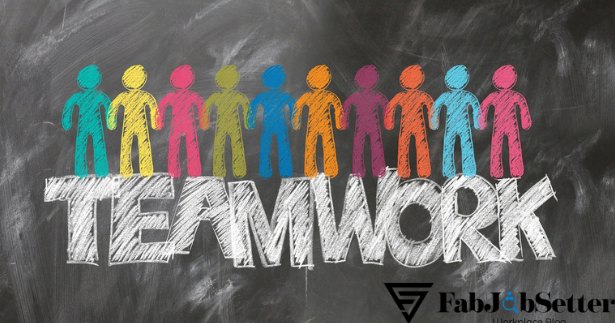Importance of teamwork in an organization.

Importance of teamwork in an organization.
A Team is a group of people who put their effort together to achieve one goal.
Teamwork leads to higher output and productivity when individuals work together, regardless of the department or service they provide. they share the same objectives and vision. When one team member wins, everyone on the team wins.
Liken it to how the parts of the body work together, even though there are many of them. Another illustration is a football team, where the players cooperate to achieve a common objective.
TEAMWORK Acronym
Together
Everyone
Achieve
More
With
Overall
Reciprocated
Knowledge

Why is teamwork important in an organization?
- Shared responsibility: when responsibilities are shared it gives quick results. To meet up pre-set timelines it is advisable to share responsibilities among team members.
- Collaboration: Collaborating with every team member enables us to find better ways to attend to customers’ requests and make them When a different unit in a firm collaborates, putting their best to work it enables us to find better ways to attend to customers’ requests and make them satisfied, thereby increasing productivity.
- Increases Bonding: Promoting a strong work relationship through team bonding exercises is very important and helps commit to promoting this practice.
- Give quick answers to problems: team members focus more on the goal and result and put all reasonable effort into achieving them. By working together, teams can find the solutions that work best.
Importance of teamwork in an organization.
- Brings about innovation: employees have to be innovative, thinking outside the box to achieve set targets. Working as a team makes it easier for team members to remember ideas and ways to make a process effective that only one person may not remember.
- Expanded knowledge: Learning is a consistent thing; no one is too knowledgeable that can be term known to all. Teamwork enables all team members to learn a new skill and improve on the already known skills, knowledge, and ideas among the team members that are consistently shared and the best adapted.
- Understanding: Working as a team makes ambiguous things became unambiguous. Increased productivity results from an understandable team member.
- More organized and make work fun: making the activity fun will make difficult tasks look simple.
- Brings expertise: everyone’s collective valuable input will assist in enhancing future growth.
- Networking: new possibilities and expand effectiveness and efficiencies. Support is very necessary for teamwork. Show concern and willingness to assist one another.
- Accomplishes uncommon results: Businesses thrive when they have a diverse team of people who can contribute to individuals Most Businesses do well when they have a diverse team of people who can contribute individual ideas.
- Teamwork gives rise to Self-esteem and confidence among team members. Team members feel valued when they contribute actively to a team that produces positive results.
- Conflict resolution is eliminated by teamwork. Because everyone on the team is working toward the same objective, there won’t be any room for miscommunication or dispute. And even if one does, fixing it is considerably simpler.

How to be a team player?
- Take ownership and responsibility: hold yourself accountable for the action taken. no one is above mistakes, learn from your mistakes and take action for improvement.do not shy away from problems when given. Never say: it is not my job, it is not my department. Rather see all problems as your ones.
- Listen attentively: listening skill is key to being a team player.
- Do not underestimate anyone: see all team members as a key factor, no matter their job function. An example is a driver or cleaner is as important as the manager. The office environment needs to be tidy for you to actively perform your function.
- Never stop learning: learning never ends, you can learn from anyone, both your superiors and subordinates.
- Communication: learn to communicate effectively with team members. Maintain an open relationship with all members and share your thoughts and knowledge.
- Do not be static: flexibility is key, learn to open to changes when you see the need for it.
- Do not be biased in decision making: if you understand the role in a team you therefore work towards the collective goals.
- Maintain a positive relationship with everyone. Never conclude on the failure of a project before you even start. This might kill the morale of other team members.
Also read: https://fabjobsetters.com/some-common-job-interview-questions-and-their-answers-to-get-your-dream-job/
IN SUMMARY
Teamwork can be likened to the parts of the body, although they are several parts they all function as one in the body.
Most job interviews begin with the interviewer asking the candidate whether he or she is a team player and how actively they can work together. This is due to the crucial role that teamwork plays in the company’s strategic objectives. People should put forth an effort to become effective team players.



